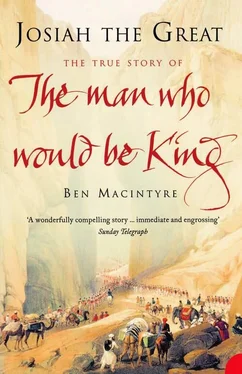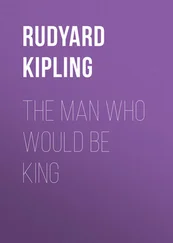Calcutta, where Harlan now abandoned ship, was the seat of British rule in India, the capital city of the Honourable East India Company. The ‘Grandest Society of Merchants in the Universe’, ‘the Company’, as it was universally known, was an extraordinary outgrowth of British history, an alliance of government and private commerce on an imperial scale, and the precursor of the British Raj. Chartered under Elizabeth I, by the early nineteenth century the Company could wage war, mint currency, raise armies, build roads, make or break princes and exercised virtual sovereignty over India. Twenty years before Harlan’s arrival, the Company’s Governor General had become a government appointment, serving the shareholders while simultaneously acting in Britain’s national interests. The Company was thus part commercial and part political, ruling an immense area through alliances with semi-independent local monarchs, and controlling half the world’s trade. This was ‘the strangest of all governments, designed for the strangest of all empires’, in Lord Macaulay’s words. Only in 1858, in the aftermath of the Indian Mutiny, would the British crown take formal control of the subcontinent.
Service with the East India Company promised adventure and advancement, and potential wealth. More immediately, for Harlan, it offered distance from Eliza Swaim, and a paid job as a military surgeon. That he had never actually studied medicine was not, at least in his own mind, an impediment. Years later he would claim that he ‘had in his early life studied surgery’, but what medical knowledge he possessed appears to have been entirely self-taught. A medical textbook was a part of every educated traveller’s baggage, and before his first voyage to Canton, Harlan had ‘taken a few of his brother’s medical books with him and then decided to use their contents in treating persons other than himself’. The rough life aboard a merchant vessel had presented opportunities to observe and treat a variety of ailments and injuries. In July 1824, with no qualifications whatever, relying on an alloy of brass neck and steely self-confidence, Harlan ‘presented himself for examination at the medical board, and was appointed surgeon at the Calcutta general hospital’. Calcutta was one of the most unhealthy places on earth, and with war looming in Burma, surgeons, however novice, were in hot demand.
For decades the expansionist Burmese had been steadily advancing along the eastern frontier of the Company’s dominion, conquering first Assam and then Shahpuri Island near Chittagong, a Company possession. Fearing an attack on Bengal itself, the British now responded in force with a seaborne army of some 11,000 men. On 11 May 1824, using a steamship in war for the first time, British forces invaded and captured Rangoon, but with Burmese resistance hardening, Calcutta ordered up fresh troops. Harlan had been on the payroll for just a few months when, to his intense satisfaction, he was transferred to the Artillery of Dum-Dum and ordered to the battlefield; if he had any qualms about violating the Quaker rules on pacifism, they were suppressed. The voyage to Rangoon by boat took more than a fortnight. Harlan was deeply impressed by the resilience of the native troops. ‘The Hindu valet de chambre who accompanied me consumed nothing but parched grain, a leguminous seed resembling the pea, during the fifteen days he was on board the vessel.’ Arriving in Rangoon in January 1825, Harlan was appointed ‘officiating assistant surgeon and attached to Colonel George Pollock’s Bengal Artillery’.
The British defeated a 60,000-strong force outside Rangoon, forcing the enemy into the jungle, but they were suffering numerous casualties, mostly through disease, and the Burmese showed no sign of surrendering. In February a young English adventurer named James Brooke was ambushed by guerrillas at Rangpur, and severely wounded by a sword thrust through both his lungs. Brooke would recover and go on to become Rajah Brooke, founder of the dynasty of ‘white rajahs’ that ruled Sarawak in Borneo from 1842 until 1946, the best-known example of self-made imperial royalty. It is tempting to imagine that the future Prince of Ghor tended the wounds of the future Rajah of Sarawak, but sadly there is no evidence of a meeting between Harlan and Brooke, two men who would be kings.
That spring the artillery pushed north, and Harlan was present at the capture of Prome, the capital of lower Burma, after ferocious hand-to-hand fighting. The Treaty of Yandaboo, in February 1826, brought the First Anglo-Burmese War to a close. After battling through two rainy seasons, the Company had successfully defended and extended its frontier, but at the cost of 15,000 troops killed and thousands more injured or debilitated by tropical disease. One of the casualties was Harlan himself, who was put on the invalid list and shipped back to Calcutta suffering from an unspecified illness.
Once he had recuperated, he was posted to the British garrison at Karnal, north of Delhi, and it was there that he discovered a soulmate who would become his ‘most faithful and disinterested friend’. Looking back, Harlan would write that this companion ‘rendered invaluable services with the spontaneous freedom of unsophisticated friendship, enhancing his favours by unconsciousness of their importance. He accompanied me with, unabated zeal throughout the dangers and trials of those eventful years.’ His name was Dash, a mixture of red setter and Scottish terrier, a dog whose fierce and independent temperament matched Harlan’s exactly. ‘Dash never maintained friendly relations with his own kind. Neither could he be brought to tolerate as a companion any dog that was not perfectly submissive and yielding to the dogged obstinacy and supremacy of an imperious and ambitious temper,’ wrote Harlan. The description fitted both man and dog. ‘Dash had always been carefully indulged in every caprice and accustomed to the services of a valet. He was never beaten and his spirit, naturally ardent and generous, maintained the determined bearing which characterises a noble nature untrammelled by the servility arising from harsh discipline. Dash could comprehend the will of his master when conveyed by a word or a glance.’
Harlan passed the time in Karnal training his puppy, cataloguing the local flora, treating the dysentery of the soldiers, and reading whatever he could lay his hands on. In 1815, literary London had been briefly enthralled by the publication of An Account of the Kingdom of Caubul, and its Dependencies in Persia, Tartary, and India, comprising a View of the Afghaun Nation and history of the Dooraunee Monarchy, a colourful two-volume description of the exotic, unknown land inhabited by the Afghan tribes. The author was the splendidly-named Mountstuart Elphinstone, an East India Company official who in 1808 had led the first ever diplomatic mission to Afghanistan, accompanied by an entire regiment of cavalry, two hundred infantry, six hundred camels and a dozen elephants. The Englishman described a wondrous journey among ferocious tribesmen and wild animals, through a landscape of savage beauty. Elphinstone had been received at Peshawar, with great pomp and ceremony, by Shah Shujah al-Moolk, the Afghan monarch then in the sixth precarious year of his reign. Ushered into the royal presence, the Englishman had found the king seated on a huge golden throne. ‘We thought at first he had on an armour of jewels, but, on close inspection, we found this to be a mistake, and his real dress to consist of a green tunic, with large flowers in gold, and precious stones, over which were a breastplate of diamonds, shaped like two flattened fleur-de-lis, an ornament of the same kind on each thigh, large emerald bracelets and many other jewels in different places.’ On Shujah’s arm shone an immense diamond, the fabled Koh-i-Noor, or Mountain of Light.
Читать дальше












